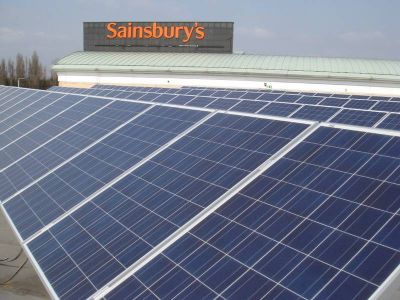British grocery chain leads UK in solar installations
 Sainsbury’s announced this week that its now the largest solar panel operator in the United Kingdom.
Sainsbury’s announced this week that its now the largest solar panel operator in the United Kingdom.
The British grocery store chain has installed 16 megawatts of solar photovoltaic panels on the expansive roofs of 169 of its stores. That’s enough solar to power 4,100 average English homes, according to a release from the company.
“At Sainsbury’s we’re keenly aware of our responsibilities as a leading retailer,” said property director Neil Sachdev. “Every day our people are working to reduce our impact on the environment and embed sustainability throughout our business, and at the same time helping to create jobs in the UK renewable energy sector.”
The company signed a large installation contract that created jobs for solar installers and reduced costs for Sainsbury’s.
The grocer’s solar installations will provide all of the power needed at each of its stores and is part of the company’s 20 by 20 sustainability plan, which it developed in October 2011. The plan sets out 20 sustainability targets Sainsbury’s wants to meet by 2020. One of them is to reduce operational carbon emissions by 30 percent absolute and 65 percent relative from 2005 levels. That’s also part of a broader target of an absolute carbon reduction of 50 percent by 2030.
“We are actively looking to install more solar panels,” Sainsbury’s spokeswoman Sarah Dunne writes in an email.
The company believes its rooftops are perfect for solar development as they provide onsite power generation that frees each store from reliance on the grid at least during daylight hours.
“We already produce far more solar power than most commercial solar farms.” Sainsbury’s CEO Justin King said in a statement. “We believe the retail sector should take another look at solar energy as a viable way to reduce its impact on the environment. Supermarkets have the equivalent of football fields on their roofs, many of them underutilised. It’s a perfect time to turn that space into something positive.”
The company believes in solar power as a viable alternative to fossil fuels even in a country known for its gloomy weather and short winter days.
“We have installed highly efficient solar PV panels that are encased in a lightweight, non-penetrating framework specifically designed for flat roofs,” Dunne writes. “The chosen framing solution provides solid weather resistance against heavy snowfall and extreme winds, while optimal tilt angles allow ventilation for cooling and maximum solar energy absorption.”
The company will continue working toward its energy conservation and generation goals.



